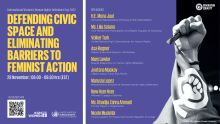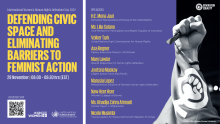On 29 November, the Action Coalition on Feminist Movements and Leadership, together with UN Women and the Office of the High Commissioner for Human Rights, held their first official commemoration of International Women Human Rights Defenders Day to centre the voices and experiences of women human rights defenders and call on the international community to provide them necessary public, political and financial support and protection.
“Their courage should give us hope and direction”: Generation Equality Action Coalition on Feminist Movements and Leadership uplifts the contributions and priorities of women human rights defenders
The event took place in the context of the 16 Days of Activism against Gender-Based Violence campaign, this year being marked under the theme “UNiTE! Activism to end violence against women and girls”. It acknowledged and celebrated the critical role that women human rights defenders play in preventing and responding to violence despite the pushback and risks that they face.
“Women in countries around the world, especially in conflict affected countries and where there are autocratic regimes, are demonstrating that they hold the key to a peaceful future for all of us. It is their courage and their example that should give us hope and direction,” emphasized UN Women Deputy Executive Director, Åsa Regnér, opening the event.
Although restrictions on civic space affect all rights defenders, women human rights defenders are expressly targeted and face additional and gendered threats and abuses, explained Naw Hser Hser, Secretary General of the Women’s League of Burma. Hser Hser noted in Myanmar, this includes sexual violence, harassment, defamation campaigns and imprisonment.
Pushing forward against the pushback
All speakers noted that more must be done to counter threats that are intended to silence women human rights defenders and reinforce unequal power relations that sustain the political, economic and social status quo.
“We must stand together against anti-rights and anti-gender narratives. We must address gender equality holistically, recognising the interdependence and indivisibility of women’s human rights,” urged UN High Commissioner for Human Rights, Volker Türk. OHCHR is a co-lead of the Action Coalition on Feminist Movements and Leadership and has made far-reaching commitments to support women human rights defenders, including by stepping up engagement and support to protection networks.
Together, the Leaders of the Action Coalition on Feminist Movements and Leadership are taking priority action to promote, expand and protect civic space for feminist action, organizing and mobilization. A key example is their collective commitment to recognise women human rights defenders of all ages and in all their diversity, to protect and enable safe environments, especially online, and to counter the gender-based discrimination, stigma and hate speech against them.
Accelerating ambition within the multilateral system
The commemoration emphasized that heightened political will and efforts from member states and the multilateral system is needed if normative commitments to rights are to be upheld.
Having described the context facing women human rights defenders on the ground in Afghanistan, Khadija Zahra Ahmadi, Former Mayor of Nili, Afghanistan, called on the international community to hold member states to account for their human rights commitments, advance justice systems and end rights violations.
“A much more systematic and coordinated approach is needed to respond to targeted attacks against women human rights defenders, especially those who engage in peace and security processes,” explained H.E. Mona Juul, Permanent Representative of Norway to the United Nations, pointing to the 14 Security Council members that have been implementing a WPS Statement of Shared Commitments that includes a zero tolerance approach to reprisals, as well as risk analysis and mitigation, to ensure civil society can safely participate in the Security Council without fear of reprisals.
Marusia López, from the Mesoamerican Initiative of Women Human Rights Defenders, pointed to the need for accelerated action to implement the “Indispensable Measures to Ensure the Holistic Protection and Leadership of Women Human Rights Defenders”. Launched at the 2021 Generation Equality Forum in Mexico City, the measures outline key demands to protect women human rights defenders within the framework of Generation Equality, including an end to the criminalization and repression of protest.
“The only thing these require to implement is political will and coordinated efforts. Only then will we be able to make progress towards a world of rights that defendants are building despite all this violence,” said López.
Women human rights defenders demand urgent action
A clear call arising across all interventions was the need to deliver flexible funding for women human rights defenders.
Jyotsna Maskay, Urgent Action Fund, Asia Pacific, shared examples of flexible and agile approaches that respond to activists’ contexts and needs. Intentional focus on specific and intersectional priorities of marginalized activists and movements is required, for example if specific defenders are not registered and do not have legal papers. In such a scenario, the Urgent Action Fund collaborates with country-based activists who guide the process so the funds can be reach marginalized defenders who need access.
Establishing networks and communities based on solidarity was also conveyed as critical in supporting women human rights defenders to advance both their practical work and wellbeing.
Nicole Musimbi, Young Leaders for Peace, Democratic Republic of Congo, described a network in Kivu created to reduce the heightened risk of rights violation that arises when working in isolation. The network is also used as a space to engage male human rights defenders as allies in changing social norms and gender stereotypes that perpetuate discrimination and inequality. Musimbi also highlighted the importance of recognizing the threats faced by WHRDs online. She went on to call on the international community to expand their support beyond workshops, to include dedicated funding, including for women human rights defenders’ mental health support.
The commemoration provided a clear path for those committed to supporting women human rights defenders. As López, from the Mesoamerican Initiative of Women Human Rights Defenders, said “We work for a sustainable activism where we don’t need to give up our lives for our cause. Where we celebrate joy, being rebellious, and caring for each other as important elements to keep hope for human rights alive.” She added, “all these strategies are focused on a feminist approach putting care at the centre of our political efforts, so that our struggles can continue to flourish. Women human rights defenders are taking on real risks of sexual violence, detention, disappearances, and femicide. We need more than words. We need practical solidarity and agile responses, digital security, language justice, political commitment and will.”

